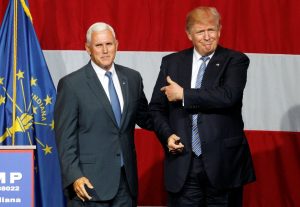
The 2020 US presidential election is different for many reasons but for those watching from other capitals, the most significant aspect might be the delay expected in getting the final results and the uncertainty in between.Trends may be known by the end of voting day on 3 November, but it would be days before the mail ballots are collected, counted, certified and a winner declared. Legal challenges and protests are likely if the losing candidate decides to cast doubt on the legitimacy of the process. Experts are even “war gaming” various scenarios to prepare for the transition.
The ability of the electoral system to meet the challenges of 2020 is under question. Even in the best of times, the US election process is a patchwork of disparate methods, rules and voter identification requirements depending on the state. In the absence of a professional election commission to adjudicate disputes, partisan state level officials decide the fate of candidates, leaving room for questionable tactics.
And 2020 isn’t the best of times – the Covid-19 pandemic is raging, social justice protests have continued through the summer, millions are unemployed, the country is more polarised than in 2016 and trust in government is only around 30%.Widespread distrust and discontent could reshape American politics in unpredictable ways, especially if the election is close or contested. The losing side is unlikely to go quietly into the night. Over time Americans have become more open to justifying violence to achieve political goals – 22 percent believe it’s occasionally acceptable to threaten political opponents, according to a poll by the Democracy Fund last year.
If that were not enough, President Donald Trump’s rhetoric is far from balmy. He has actively encouraged violence by telling supporters to “knock the hell” out of protesters whom he routinely calls “thugs,” he has demonized immigrants and called opponents “vicious socialists.” In several cases, his rhetoric has actually led to violence.
Trump has refused to publicly commit he would accept the election results, laying the ground for confusion. His mixed messages on the validity of mail ballots even though in the past he himself has voted by mail in Florida have alarmed Democrats. Of late he has claimed mail ballots are prone to fraud, asking voters to “test” the system by voting once by mail and then trying to vote in person. His advisers rushed to say that would be illegal.
The Democrats say Trump’s statements are a part of his election strategy to muddy the waters around mail ballots where their candidate, Joe Biden, has a decisive advantage. In fact, Biden’s campaign strategy has centered around encouraging people to vote by mail because of the pandemic.
The Democrats say Trump’s statements are a part of his election strategy to muddy the waters around mail ballots where their candidate, Joe Biden, has a decisive advantage. In fact, Biden’s campaign strategy has centered around encouraging people to vote by mail because of the pandemic.Against this background it seems plausible the transition of power in one of the world’s oldest democracies may not be smooth, especially when emotional extremism on both sides is high. Whichever candidate wins, the opposing side is unlikely to concede in a hurry.
In other words, a potential political crisis looms, especially given recent history. The US Supreme Court’s controversial decision in “Bush vs. Gore” in 2000 still rankles Democrats who feel the presidency was stolen from them. The Supreme Court stopped the recount of votes in Florida, overturned a lower court decision and essentially granted the presidency to George W. Bush. The decision remains a subject of debate among constitutional experts to this day.
Going further back in history, the election of 1876 offers lessons on how far afield the ball can wander. The times were equally polarised, partisanship was acute and the matter of presidency could be settled only by a grand political bargain.The Democrats conceded the presidency to the Republicans in return for an end to Reconstruction, which had abolished slavery and given Blacks civil rights. What followed was the era of Jim Crow laws mandating racial segregation in the South. African Americans lost all they had gained.
Yes, the Democrats were on the wrong side of justice then while the Republicans were the protectors of African American rights. Abraham Lincoln who issued the Emancipation Proclamation freeing the slaves was a Republican. Over the last five decades, the ground has gradually shifted and today African Americans overwhelmingly favor the Democratic Party.Could the 1876 scenario repeat itself? The Transition Integrity Project or TIP, an effort launched in June this year, looked at the possibility by war gaming four scenarios – ambiguous result, a clear Biden victory, a clear Trump win and a narrow Biden win.
More than 100 Republicans and Democrats took part in the “crisis scenario planning exercises” and found the “administrative transition process itself may be highly disrupted” because Trump “would prioritize personal gain and self-protection over ensuring an orderly” handover of power. Only in the case of a big Biden victory was the transition relatively peaceful.More than 100 Republicans and Democrats took part in the “crisis scenario planning exercises” and found the “administrative transition process itself may be highly disrupted” because Trump “would prioritize personal gain and self-protection over ensuring an orderly” handover of power
The overall advice: plan for a contested election, focus on readiness at the state level, gather political support for a complete and accurate count and prepare for lies about “voter fraud” and possible violence. The experts noted that as an incumbent, Trump has a “huge advantage” because he can use federal troops and unleash a “politicized” Department of Justice on opponents.
But why must such scenarios be contemplated in the first place? The short answer: Electoral College and the two-step process for the election of the president and vice president. The complicated system is one of the main reasons every four years Americans debate whether their democracy is truly representative.
The system allows a candidate victory even if he or she doesn’t get the popular vote. Americans actually vote for 538 electors who then vote for the president and vice president. At least 270 electoral votes are needed to win. The number of “electors” for each state is the same as the number of Congressional representatives. But what complicates the process is the “winner-take-all” system which negates the votes of the opponent while stacking the victor’s electoral college votes.Hillary Clinton won the popular vote in excess of 3 million but lost the electoral vote to Trump. States like Florida can play a larger-than-life role as it did in 2000.Perhaps it’s time the world’s most powerful democracy had a more professionally managed election process and uniform rules.
Courtesy:ORF
Author Profile
- India Writes Network (www.indiawrites.org) is an emerging think tank and a media-publishing company focused on international affairs & the India Story. Centre for Global India Insights is the research arm of India Writes Network. To subscribe to India and the World, write to editor@indiawrites.org. A venture of TGII Media Private Limited, a leading media, publishing and consultancy company, IWN has carved a niche for balanced and exhaustive reporting and analysis of international affairs. Eminent personalities, politicians, diplomats, authors, strategy gurus and news-makers have contributed to India Writes Network, as also “India and the World,” a magazine focused on global affairs.
Latest entries
 DiplomacyJanuary 5, 2026India walks diplomatic tightrope over US operation in Venezuela
DiplomacyJanuary 5, 2026India walks diplomatic tightrope over US operation in Venezuela India and the WorldNovember 26, 2025G20@20: Africa’s Moment – The Once and Future World Order
India and the WorldNovember 26, 2025G20@20: Africa’s Moment – The Once and Future World Order DiplomacyOctober 4, 2025UNGA Resolution 2758 Must Not Be Distorted, One-China Principle Brooks No Challenge
DiplomacyOctober 4, 2025UNGA Resolution 2758 Must Not Be Distorted, One-China Principle Brooks No Challenge India and the WorldJuly 26, 2025MPs, diplomats laud Operation Sindoor, call for national unity to combat Pakistan-sponsored terror
India and the WorldJuly 26, 2025MPs, diplomats laud Operation Sindoor, call for national unity to combat Pakistan-sponsored terror







